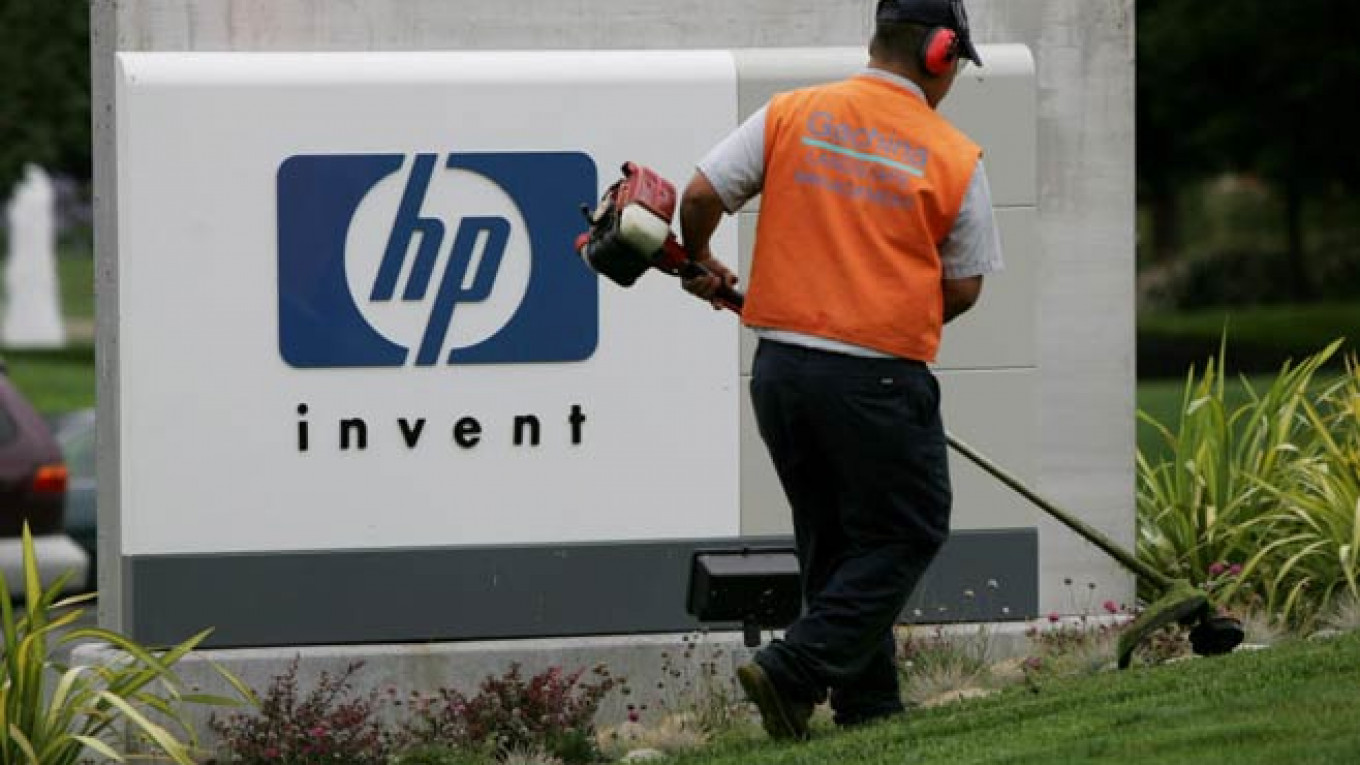Large companies in Russia are taking vigorous steps against corruption under the threat of prosecution abroad, even as the domestic legal system veers between stern threats and erratic enforcement.
The issue came to a head Wednesday as multinational IT company Hewlett-Packard's Russian subsidiary pleaded guilty in the U.S. to paying millions of dollars in bribes to Russian prosecutors.
Hewlett-Packard agreed to pay $108 million total in settlements, ending the U.S. government's investigation into the companies' actions in Russia, Poland and Mexico under the Foreign Corrupt Practices Act, or FCPA.
But based on past experience, Hewlett-Packard may never face prosecution in Russia for these offenses.
The situation underscores the state of compliance in Russia: despite limited prosecution on the domestic level, a raft of new legislation and the threat of prosecution abroad is increasingly drawing companies' attention to compliance.
"There is now a great awareness of the risk of prosecution. Companies are very focused on compliance, on trying to prevent violations," said Brian Zimbler, managing partner at the Moscow office of international law firm Morgan Lewis.
This increased focus has been fortified by an amendment to the law "On Preventing Corruption" that came into force last year, requiring all Russian companies to implement internal measures to counter corruption.
Among large domestic firms and multinationals with operations in Russia, article 13.3 has facilitated a "seismic shift" toward a culture of compliance by giving in-house legal counsel the grounds to insist that anti-corruption efforts be placed front and center, said Kevin Robinson, a partner in Morgan Lewis's litigation practice.
While there are no specific penalties for violating the article, following its guidelines will help corporate entities prove that they took all possible measures to prevent corruption in the event of prosecution.
The amendment marks an attempt to bring Russia up to international standards, Zimbler said.
Russia makes "important strides'
Article 13.3 is just one in a series of "very important strides" that Russia has made in developing a legislative framework to combat corruption, said Thomas Firestone, senior counsel in the London office of international law firm Baker & McKenzie, who formerly served as resident legal advisor at the U.S. Embassy in Moscow.
Laws passed in the last few years have criminalized transnational bribery and acting as an intermediary to bribery, while the penalties for bribery both at home and abroad have increased, Firestone said.
While the state has not yet pursued many large cases, a number of lower-level cases have already been filed under these statutes, he added.
More than 28,000 anti-corruption cases were filed last year, up from 18,000 in 2012. In total, prosecutors uncovered 9,000 episodes of corruption compared to 6,000 the year before, Investigative Committee chief Alexander Bastrykin said in February, RIA Novosti reported.
Bastrykin promised that preventing corruption would be a top priority in 2014, especially in light of a planned three-year privatization program expected to bring 1 trillion rubles ($28.1 billion) to state coffers.
Several other important measures, such as training government officials in how to fight corruption and limiting government contracts with businesses whose major shareholders are closely related to state officials, were also included in the Executive Order on the National Anti-Corruption Plan for 2012 and 2013.
These improvements were noted and praised by the Organization for Economic Cooperation and Development's Working Group on Bribery in its Phase 2 report on Russia, published in October last year.
U.S. legislation still leads anti-corruption fight
But despite these tokens of progress, Russia has yet to prosecute the kinds of major corruption cases that the U.S. has taken under the FCPA against multinationals such as Hewlett-Packard for corrupt activities on Russian territory.
Through the FCPA, the U.S. has in the past decade taken on the role of global compliance enforcer to the world's largest and most powerful companies. In 2010, U.S. prosecutors won a $185 million settlement from German corporation Daimler AG after the company's Russian subsidiary confessed to paying state officials in order to win contracts.
Part of the difference is in the letter of the law itself. The U.S., unlike Russia, can hold corporations criminally liable and fine them accordingly.
In contrast, "the Russian criminal legislation is focused on individuals who do corrupt things, they do not really have this concept of a corporate crime," Zimbler said. However, under an article to the administrative code passed in 2011, companies may be fined up to 100 times the amount of any bribe offered, promised or given.
The U.S. also benefits from a system of "deferred prosecution agreements," such as the one reached with Hewlett-Packard and Daimler AG, by which the defendant agrees to cooperate fully with the authorities and meet certain demands in exchange for the charges ultimately being dismissed. The system thereby encourages companies to self-report rather than risk even higher penalties.
In general, these two factors — the threat of massive fines and practice of self-reporting — are intrinsically connected, and based on other countries' experience will likely develop hand-in-hand over time, Firestone said.
"Self-reporting is itself a function of a potent threat of enforcement, so it is a chicken and the egg situation, the fewer cases they make, the fewer companies come in to self-report," he said.
Whistle-blowers punished but international pressure builds
Just as companies are unlikely to confess to corruption in Russia, individuals who have witnessed or participated in corrupt activity also rarely report to the authorities for want of proper protection.
The OECD's report listed the lack of a "comprehensive framework to regulate whistle-blower protection for corporate employees" as a key flaw in Russia's anti-bribery efforts. A 2013 report by global anti-corruption watchdog Transparency International also noted whistle-blower protection as "a serious concern."
In the international eye, the vulnerability of whistle-blowers has acquired a face and name: Sergei Magnitsky. Magnitsky died in pre-trial detention in 2009, accused of the same embezzlement that he had claimed was perpetrated by the police and tax authorities.
While there is no direct indication that the Russian authorities plan to model legislation on the FCPA or other foreign anti-bribery laws, they are likely "following these developments very carefully," Zimbler said.
In other areas of law, such as competition regulation, it is clear that the Russian authorities carefully study the practices of other countries, and the European Union in particular, Zimbler added.
Whether or not they ultimately adopt such measures, compliance practices within Russia are likely to continue to improve by virtue of foreign countries' heightened focus on prosecuting foreign bribery cases.
The U.K. Bribery Act of 2010 has for the first time empowered British prosecutors to take legal action against any company with ties to the Britain, even if the crime in question was committed abroad.
This was a "a very very significant change in the legal landscape," and British prosecutors appear intent on employing their new purview to pursue cases of the same multimillion-dollar scale that they have seen U.S. prosecutors take on and win, Morgan Lewis's Robinson said.
In the past four years more than a dozen countries, among them Brazil, Canada and China, have adopted similar legislation to combat foreign bribery.
This tightening circle of international oversight plus increased oversight within Russia is already producing the same gradual, systemic change that has been observed abroad, Robinson said.
The movement begins with the multinationals, those with the most to lose, and then "trickles down the corporate food chain to smaller and smaller corporates. We saw this in the U.S., now in Britain, and I do not doubt you will see it in Russia as well," Robinson said.
More time needed for domestic system
The domestic system will also benefit from one basic and invaluable variable — time. Corporate bribery cases are complex and time-consuming, requiring a mature system of enforcement that can take many years to develop.
But regardless of positive change, there is still a long road ahead. According to business lobby group Opora Rossii, about 90 percent of entrepreneurs have encountered corruption at least once in their careers and view it as a significant obstacle to entering into business.
Russians see this tension between policy and actual enforcement play out daily in the national news. In an emblematic case still underway in the Russian courts, the General Prosecutor's Office in 2012 went after top officials in the Defense Ministry thought to have embezzled millions of dollars by selling off government property at below-market prices
Defense Minister Anatoly Serdyukov was fired as the prosecution took off and charged in November with using state funds to finance construction of a road in the Astrakhan region at an estimated cost to the government of 56 million rubles ($1.7 million).
While cases continue against lower-level officials and their conspirators, Serdyukov was reportedly amnestied early this year. His lawyer said in March at a meeting of the Moscow Club of Lawyers that the sides had agreed not to "excite the public" by broadcasting information of the decision, RAPSI reported.
Contact the author at d.damora@imedia.ru
A Message from The Moscow Times:
Dear readers,
We are facing unprecedented challenges. Russia's Prosecutor General's Office has designated The Moscow Times as an "undesirable" organization, criminalizing our work and putting our staff at risk of prosecution. This follows our earlier unjust labeling as a "foreign agent."
These actions are direct attempts to silence independent journalism in Russia. The authorities claim our work "discredits the decisions of the Russian leadership." We see things differently: we strive to provide accurate, unbiased reporting on Russia.
We, the journalists of The Moscow Times, refuse to be silenced. But to continue our work, we need your help.
Your support, no matter how small, makes a world of difference. If you can, please support us monthly starting from just $2. It's quick to set up, and every contribution makes a significant impact.
By supporting The Moscow Times, you're defending open, independent journalism in the face of repression. Thank you for standing with us.
Remind me later.






